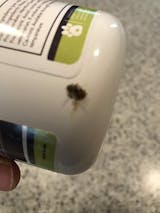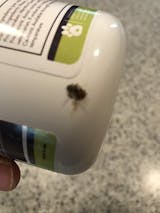Mosquito bites are a real nuisance in our everyday lives. Redness, itchiness, and swelling… Not to mention the buzzing sound in our ears when we’re trying to sleep, it can be super irritating. However, for our dogs, a mosquito bite is not only annoying and an inconvenience, but also very dangerous.
Mosquito bites in dogs
Just like it happens among humans, mosquito bites can cause itchiness, swelling, and hives in your dog’s skin. It’s rather annoying, but the bite is actually pretty harmless, and it doesn’t constitute a danger itself. However, the most common problem in a bite occurs if the mosquito carries the heartworm larvae. If it does, it can infect dogs with heartworm disease, which represents a real danger for them.
Depending on the area, the season of the year, and the place you live in, mosquitoes can represent a pretty serious issue in both dogs' and humans' lives. But let me put it in simple words: unless you live in Iceland or Antarctica (the two only mosquito-free places in the world), you will have to deal with these annoying insects, to a greater or a lesser extent.
Heartworm disease in dogs
Heartworm disease is caused by a parasite known as Dirofilaria immitis. It is a severe condition that can affect your dog’s lungs, heart, and blood vessels. The infected dog acts like a ‘host’, providing the worm with the ideal conditions for maturing, mating, and producing offspring.
Even though heartworms can be worrying and life-threatening, the good news is that they can be treated.
Can People get heartworms from their dogs?
No, they can’t. Dogs don’t transmit the disease. The only way to get heartworms is through mosquito bites, and even in that situation, humans are not an ideal host for heartworms, so larvae will die before maturing.
Symptoms of heartworms
Dry cough: When heartworms get to the lungs, your dog will experience some coughing, especially after exercising.
Inactivity or drowsiness: Beware if you notice anything unusual in his behavior. This kind of infection makes your dog feel weaker and with a lower energy level.

Loss of appetite or weight loss: This is always a sign of concern. Not only for heartworms but also for many other canine conditions. Pay attention to your dog’s eating behaviors.
Agitated breathing: Once the lungs begin to retain fluid, it will be harder for your dog to receive oxygen, which will result in agitated rapid breathing.
Nosebleeds or fainting: In more advanced stages, your dog can bring up blood and suffer from fainting.
If you notice your dog is experiencing any of these symptoms, you should take him to the vet as soon as possible. Pay special attention if your dog has been exposed to an area full of mosquitoes. As heartworms progress, treatment gets more invasive and less effective, so it’s important to act fast. If your vet suspects heartworm disease, he/she will run some blood tests to confirm or dismiss the diagnosis.
Treatment
If your dog is diagnosed with heartworm, your vet will indicate the appropriate treatment according to his health, age, and disease stage. Usually, it will include injections, pills, and topical solutions. Approximately 6 months after the treatment is completed, your vet will run some blood tests to confirm the heartworms are completely gone, for good.
Once worms are fully eliminated, you should seriously consider administering your pup yearly heartworm prevention. Regardless of where you live or your dog’s age, remember that preventive medicine is the best way to treat heartworms. These meds will be prescribed by your vet, and they are available as chewable pills, topical solutions, and injections.
















